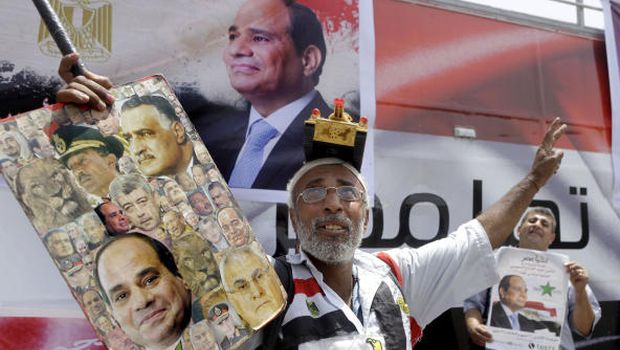
An Egyptian supporter of Abdel-Fattah El-Sisi celebrates the nation’s former military chief during a rally in Tahrir Square, in Cairo, Egypt, on Friday, May 30, 2014.(AP Photo/Amr Nabil)
Cairo, Asharq Al-Awsat—Egyptian political parties have locked horns with the government over a proposed parliamentary election law which they rejected as detrimental to the country’s transition to democracy, threatening escalation if the government insists on pushing ahead with the controversial bill.
Speaking to Asharq Al-Awsat, Councilor Mahmud Fawzi, spokesman for the Ministry of Transitional Justice, said that the committee tasked by interim President Adly Mansour to draft the law will convene on Sunday to discuss the parties’ objections.
The committee includes legal experts and academics, and is headed by Minister of Transitional Justice Amin El-Mahdi.
Opponents of the legislation among Egypt’s political parties released a statement last week describing it as “a disaster for the prospects of democratic transition in Egypt.”
The bill proposes a complex system in which 120 of the 600 seats in the Egyptian parliament are elected under an open list system, with the other 80 percent retaining the system of individual candidates.
According to the draft law, the 120 seats elected under the list system are awarded to the list that wins the largest number of votes.
The draft law also allocates several electoral districts to “closed lists,” where voters cast votes for parties rather than individual candidates nominated by a party.
Councilor Fawzi said that during its meeting on Sunday the committee would be considering two requests from Egyptian political parties: to raise the number of seats elected on the list system from 20 to 50 percent of the total, and to shift completely to a closed list system where list members are elected in proportion to the number of votes won by each list.
Defending the bill, he said the committee members believe they had laid down the provisions of the law in a way that reflects “the reality” in the country.
“The committee accommodated a constitutional request to offer positive preferential treatment to some segments [of society] and concluded that the open lists are the best, and perhaps the only, method to see this done,” he told Asharq Al-Awsat.
The current conflict between the parties opposed to the draft law and the authorities is likely to escalate, given the significant political role given to the parliament in the new constitution passed in a public referendum earlier this year.
The differences between the two sides over the bill also come amid public criticisms levelled at Egypt’s various political parties for their poor showing in last week’s presidential election.
Although he was backed by three key political parties—Karama, Al-Dostour, and the Socialist Popular Alliance—leftist candidate Hamdeen Sabahy was overwhelmingly defeated in the first round, according to preliminary figures, winning less than a million votes.
It is not clear whether President Mansour will approve the law on the election of Egypt’s House of Representatives—the sole chamber of parliament, formerly known as the People’s Assembly—before leaving his post, or leave it for Egypt’s next president.
The State Council had received the electoral law for review on Saturday, together with a new draft law governing the exercise of political rights. Approval by the president, who currently holds the power to pass laws in the absence of parliament, is the next step in the process.
Despite the broadside launched by the parties against the proposed law, Mohamed Sami, a senior figure in the Karama Party, told Asharq Al-Awsat on Saturday that his party, together with its allies, were giving space for dialogue to work, but did not rule out the option of escalation.
In the same vein, party sources told Asharq Al-Awsat that intensive contacts are currently underway between the parties to discuss ways to put pressure on the government if the law is passed. A number of parties have already threatened to boycott the forthcoming parliamentary polls, which are to begin at the end of next month, as per the constitution.
In contrast, a leader of the Salafist Nour Party ruled out a boycott. Amr Mikki told Asharq Al-Awsat said that Nour’s leaders believed they had a responsibility to play a positive role “at [this] critical moment the country is going through.”
“The narrow party view must be brushed aside when considering the national interest,” he added.
Following the referendum on a new constitution and this month’s presidential election, the election of a new parliament is the final stage of the transitional ‘road map’ drawn up by the army in consultation with a number of political figures and movements following the ousting of former President Mohamed Mursi in July of last year.
